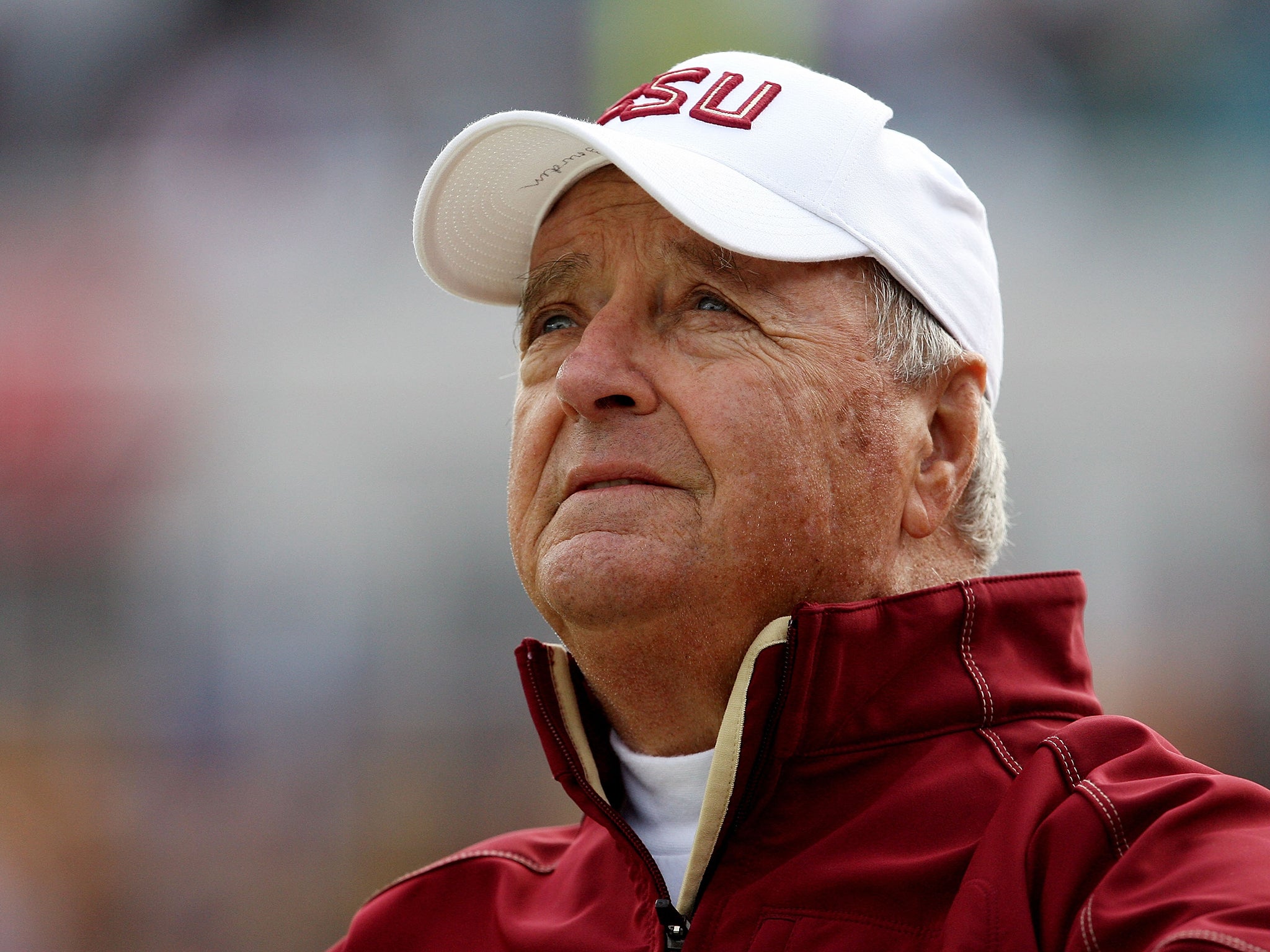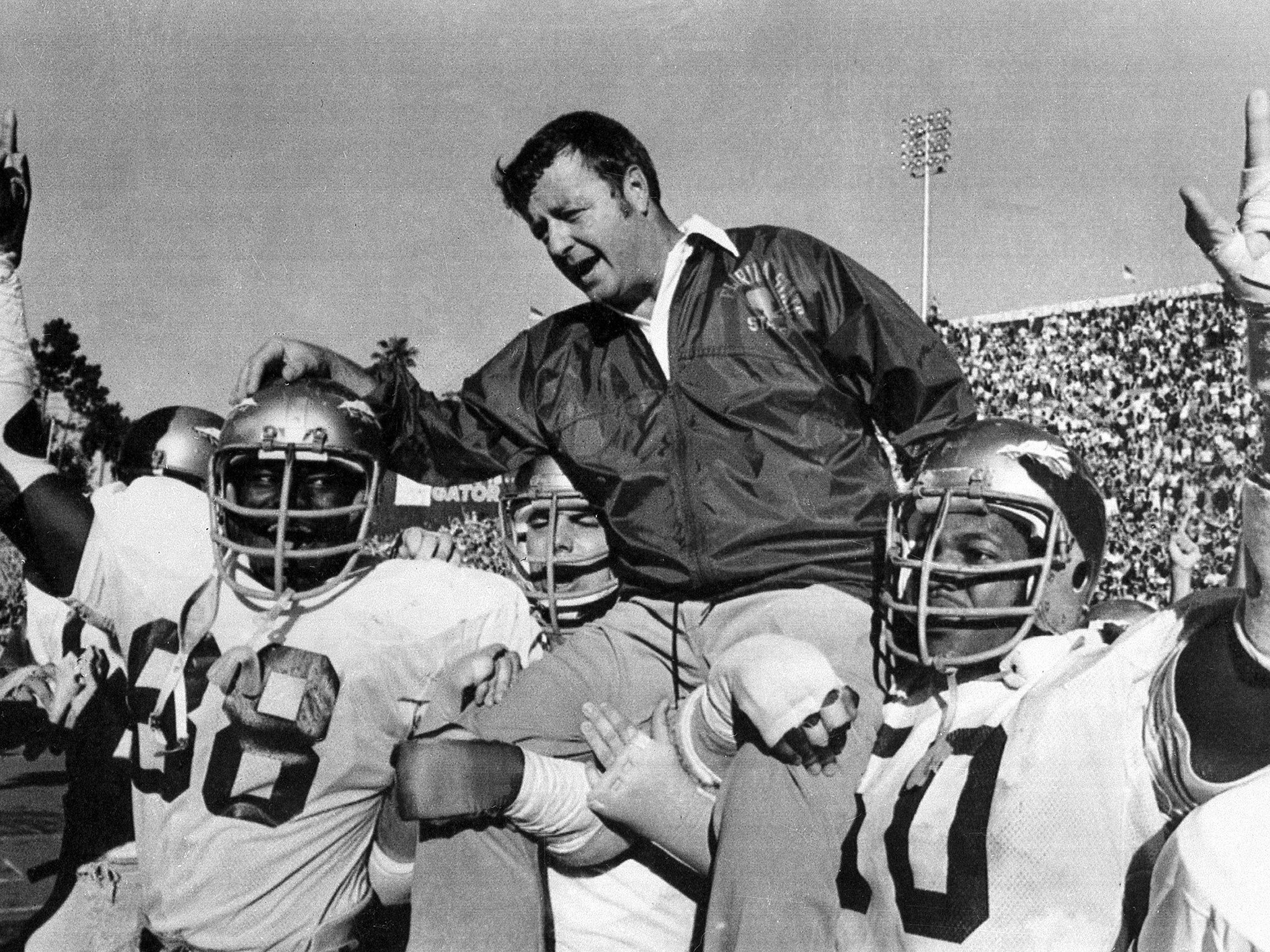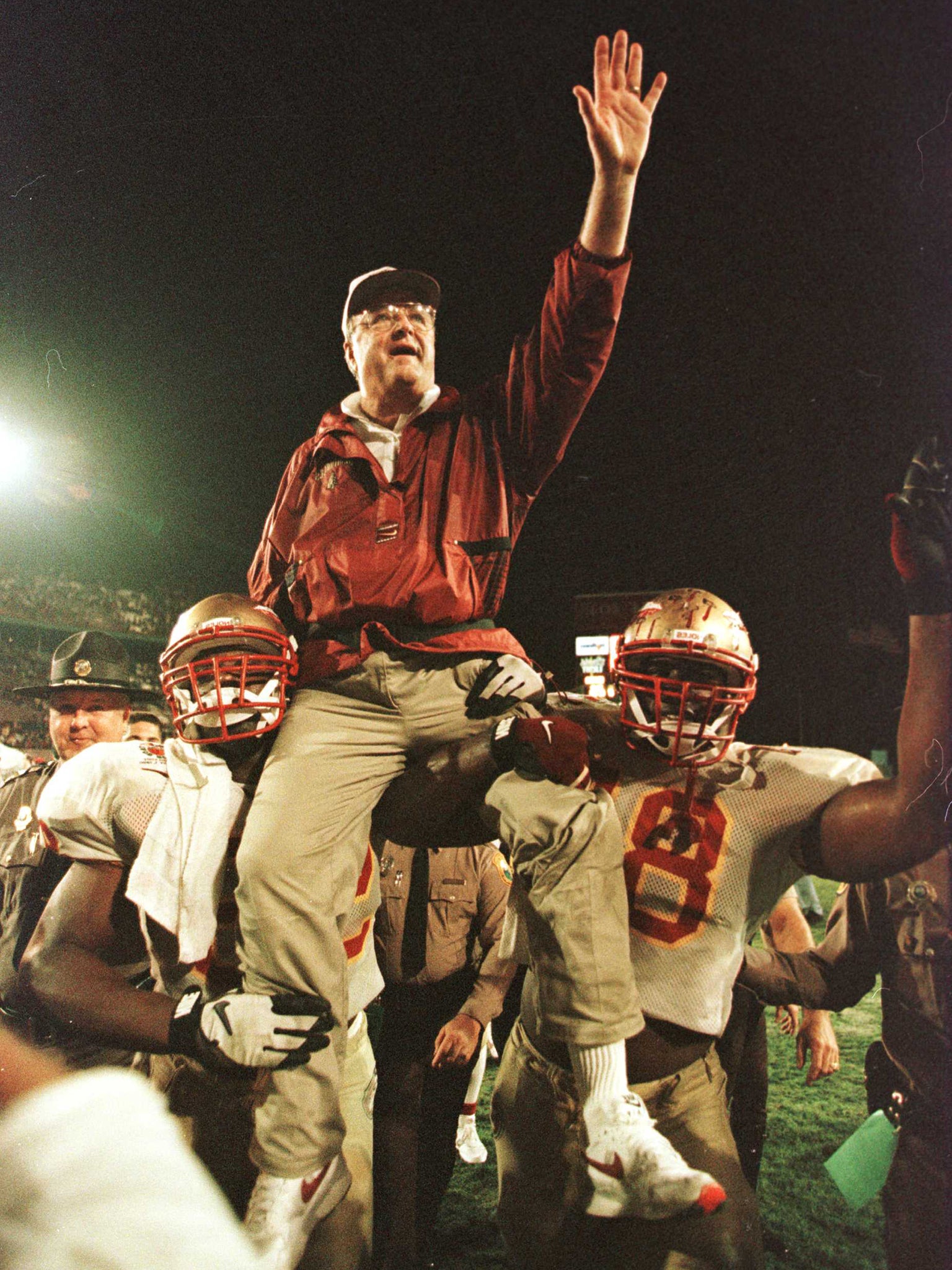Bobby Bowden: Coach who made Florida State a football powerhouse
A folksy Southern Baptist, his ‘Old Testament’ approach to the game saw more than 150 of his college players go on to be drafted by NFL teams

Bobby Bowden, who became one of the winningest college football coaches of all time during his 34 years at Florida State University and helped transform his adopted state into a gridiron powerhouse, liked to recall where it all began: at 13, bedridden with rheumatic fever, listening to news about the Second World War on the family radio in Birmingham, Alabama.
“Rommel was a great tactician – he knew how to think in surprises,” Bowden once said, referring to the German field marshal dubbed “the Desert Fox”. “He could do more with less than any of the great generals. They all demonstrate discipline and that you need reserves so if you’re getting annihilated on one front, you can attack somewhere else.”
Analogies between football and battlefields have become cliched, but to Bowden, who died aged 91, the link was a vital and defining part of his Hall of Fame career.
Trick plays became a signature of Bowden’s high-scoring, thrill-a-minute offences. His strategic deployment of players on defence helped him build Florida State, where he coached from 1976 until being pushed into retirement in 2009, from an also-ran into a force in the college football world.
“He is the guy who realised the great potential of the state of Florida,” said Steven Travers, author of the book Pigskin Warriors: 140 Years of College Football’s Greatest Traditions, Games, and Stars.
Travers said Bowden “created a dynasty” at Florida State while the University of Miami programme was also on the rise, followed by the University of Florida. “But up until Bowden came along,” he said, “Florida was a little bit of a backwater in college football.”
Bowden’s most famous trick play came on 18 September 1988, against South Carolina’s Clemson University.
The game was tied at 21 with 1:31 remaining in the fourth quarter. Florida State faced fourth and four from its own 21-yard line. Across football, seemingly every coach at every level knows that the proper thing to do is punt. Not Bowden. He ordered a fake punt, which surprised even his own players. It worked. Safety LeRoy Butler carried the ball for 78 yards to set up the winning field goal. The play became known as the “Puntrooskie”.
But all the creative playcalling in the world wouldn’t have mattered if Bowden hadn’t recruited players capable of executing those plays. More than 150 of his players went on to be drafted by NFL teams, and three have been inducted into the Pro Football Hall of Fame.
The King of the Living Room, as one scribe dubbed Bowden for his ability to win blue-chip recruits, was a Southern Baptist who peppered his speech with “dadgum” – his favourite expression, a milder version of “goddam” – and “shore-nuff”. He dropped peanuts into his orange soda, chomped on unlit cigars and chewed tobacco long after it became a public taboo.
During a 44-year head coaching career, Bowden won two national championships and was officially credited with 377 victories, the fourth most in college football history. Bowden was inducted into the College Football Hall of Fame in 2006, when he was still active as a coach.

Bowden built the Florida State football team into one of the college game’s greatest juggernauts by combining country boy charm with the cunning scheming of the Second World War generals he admired.
“On game day, he’s Old Testament, an eye for an eye, a tooth for a tooth,” his son Tommy Bowden, a former Clemson football coach, told the CBS news programme 60 Minutes II. “The love, grace and mercy of the New Testament, that’s not covered till Monday after the game.”
Robert Cleckler Bowden was born in Birmingham, Alabama, on 8 November 1929. His father was a banker, and his mother was a homemaker.
Because he had rheumatoid fever and an enlarged heart, doctors advised Bowden not to play sports, but he became a star running back in high school and made the University of Alabama football team as a freshman.
After one semester, he transferred to Howard College, now Samford University, in Birmingham. He and Ann Estock were married in 1949 and had six children. Three of his sons, Tommy, Terry and Jeff, all had careers coaching in college football programmes.
Bowden was a standout on Howard’s football team and received a bachelor’s degree in education in January 1953. Later that year, he earned a master’s degree in education from George Peabody College, now part of Vanderbilt University in Nashville.
In 1955, Bowden won his first head coaching job at what was then South Georgia Junior College, where he also coached the basketball and baseball teams and served as athletic director.
He returned to Howard as the head coach, compiling a 31-6 record from 1959 to 1962, then went to Florida State as a receivers coach. In 1966, he became the offensive coordinator at West Virginia University before being promoted to head coach in 1970. He was 42-26 in six seasons at West Virginia.
When Bowden took the Florida State job in 1976, he faced a daunting task: the Seminoles had won just four games in the previous three seasons combined.

Bowden had a losing record his first year – the only one during his time in Tallahassee. In 1977, his Florida State team routed archrival Florida and won 10 games, the first team from the state to do so.
Bowden succeeded in part because he made the unusual decision to put his fastest players on defence, particularly at defensive end and cornerback, the position at which Deion Sanders became an all-American.
Bowden and his staff wrestled with whether to put the speedy Sanders, now a Pro Football Hall of Famer, at wide receiver or cornerback. Ultimately, Bowden played him at cornerback, where he could shut down an opponent’s best receiver by himself, helping give FSU a dominating defence.
“That certainly changed the philosophy as far as what do you do with your best personnel,” Mark Richt, a former FSU assistant who later became the head coach at Georgia and Miami, told ESPN.
Florida State won at least 10 games in a season 18 times under Bowden, including every year from 1987 through 2000. Still, as the wins piled up, he collected a reputation for being unable to win the big game.
The most dramatic loss came to be known as the “Wide Right” game, because that’s how place kicker Gerry Thomas missed a field goal against Miami in 1991 with 29 seconds left. The loss knocked Florida State out of championship contention. The next year, in what became known as “Wide Right II”, place kicker Dan Mowrey missed a 22-yard field goal that would have tied Miami.
Bowden won his first national championship in 1993, but even that came with controversy because the team that finished second, Notre Dame, had beaten FSU earlier in the year.
His greatest season came in 1999, when the Seminoles defeated rivals Miami and Florida before besting No 2-ranked Virginia Tech in the Sugar Bowl, 46-29. Florida State finished 12-0 and became the first team in history to be ranked No 1 from the preseason through the end of the season.
His admirers called him “Saint Bobby,” but Bowden’s career was not without controversy. In 1993, he suspended five players for receiving gifts from agents, a scandal that led the then Florida coach Steve Spurrier to call FSU “Free Shoes University”.
In 2009, football was among 10 sports teams at FSU penalised by the NCAA in an academic cheating scandal. Bowden was forced to resign at the end of the 2009 season, not long after his 80th birthday.
Although he was cleared of wrongdoing, the NCAA’s punishment of Florida State included vacating 12 of the team’s wins in 2006 and 2007 for using academically ineligible players. The ruling dropped Bowden’s official win total from 389 to 377.
As a coach, Bowden was sometimes criticised for being too lax with players who broke team rules or were arrested. He acknowledged the criticism, but he often chose forgiveness over punishment.
“People love to see a hanging,” Bowden said on 60 Minutes II. “And I don’t want people hanging my players. Oh, yes, punish him for it. Punish him for it, but give him another dadgum chance. Two chances? I don’t give them two chances, you know? Coaches who can’t change with the times, Charlie, they ain’t here no more. They don’t last.”
Bobby Bowden, coach, born 8 November 1929, died 8 August 2021
© The Washington Post


Bookmark popover
Removed from bookmarks